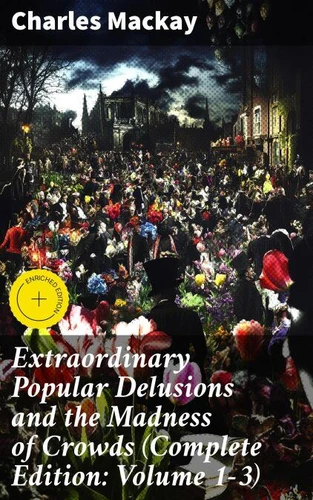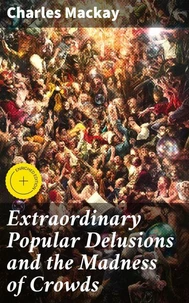Extraordinary Popular Delusions and the Madness of Crowds (Complete Edition: Volume 1 - 3). Enriched edition. Exploring the Psychology of Mass Hysteria and Financial Bubbles
Par : ,Formats :
Disponible dans votre compte client Decitre ou Furet du Nord dès validation de votre commande. Le format ePub est :
- Compatible avec une lecture sur My Vivlio (smartphone, tablette, ordinateur)
- Compatible avec une lecture sur liseuses Vivlio
- Pour les liseuses autres que Vivlio, vous devez utiliser le logiciel Adobe Digital Edition. Non compatible avec la lecture sur les liseuses Kindle, Remarkable et Sony
 , qui est-ce ?
, qui est-ce ?Notre partenaire de plateforme de lecture numérique où vous retrouverez l'ensemble de vos ebooks gratuitement
Pour en savoir plus sur nos ebooks, consultez notre aide en ligne ici
- Nombre de pages658
- FormatePub
- ISBN859-65--4777516-4
- EAN8596547775164
- Date de parution11/12/2023
- Protection num.Digital Watermarking
- Taille2 Mo
- Infos supplémentairesepub
- ÉditeurGOOD PRESS
Résumé
In "Extraordinary Popular Delusions and the Madness of Crowds, " Charles Mackay masterfully examines the psychological underpinnings of mass movements and collective behaviors, revealing the tribulations of human folly across history. This comprehensive three-volume edition delves into notorious phenomena such as tulip mania, witch hunts, and the South Sea Bubble, employing a narrative style that is both accessible and richly descriptive.
Mackay's exploration transcends mere historical account, presenting a critical analysis of the irrational impulses that can grip societies, demonstrating how susceptible individuals are to the whims of public opinion and social contagion. Charles Mackay, a Scottish journalist and poet born in 1814, had a keen interest in social psychology and the nature of human behavior. His experiences witnessing the tumult of the Victorian era, marked by economic upheaval and fervent trends, instilled in him a deep skepticism towards the collective mindset.
This influenced not only his work as a commentator during his time but also fueled his desire to dissect the recurring patterns of madness that lead people from reason to irrationality. This remarkable work is an essential read for anyone seeking to understand the complexities of human behavior within a societal context. Mackay's enduring insights reveal the persistent relevance of his analyses today, making it a compelling choice for historians, psychologists, and general readers interested in the dynamics of crowd psychology and the often bewildering nature of human folly. In this enriched edition, we have carefully created added value for your reading experience: - A succinct Introduction situates the work's timeless appeal and themes. - The Synopsis outlines the central plot, highlighting key developments without spoiling critical twists. - A detailed Historical Context immerses you in the era's events and influences that shaped the writing. - A thorough Analysis dissects symbols, motifs, and character arcs to unearth underlying meanings. - Reflection questions prompt you to engage personally with the work's messages, connecting them to modern life. - Hand-picked Memorable Quotes shine a spotlight on moments of literary brilliance. - Interactive footnotes clarify unusual references, historical allusions, and archaic phrases for an effortless, more informed read.
Mackay's exploration transcends mere historical account, presenting a critical analysis of the irrational impulses that can grip societies, demonstrating how susceptible individuals are to the whims of public opinion and social contagion. Charles Mackay, a Scottish journalist and poet born in 1814, had a keen interest in social psychology and the nature of human behavior. His experiences witnessing the tumult of the Victorian era, marked by economic upheaval and fervent trends, instilled in him a deep skepticism towards the collective mindset.
This influenced not only his work as a commentator during his time but also fueled his desire to dissect the recurring patterns of madness that lead people from reason to irrationality. This remarkable work is an essential read for anyone seeking to understand the complexities of human behavior within a societal context. Mackay's enduring insights reveal the persistent relevance of his analyses today, making it a compelling choice for historians, psychologists, and general readers interested in the dynamics of crowd psychology and the often bewildering nature of human folly. In this enriched edition, we have carefully created added value for your reading experience: - A succinct Introduction situates the work's timeless appeal and themes. - The Synopsis outlines the central plot, highlighting key developments without spoiling critical twists. - A detailed Historical Context immerses you in the era's events and influences that shaped the writing. - A thorough Analysis dissects symbols, motifs, and character arcs to unearth underlying meanings. - Reflection questions prompt you to engage personally with the work's messages, connecting them to modern life. - Hand-picked Memorable Quotes shine a spotlight on moments of literary brilliance. - Interactive footnotes clarify unusual references, historical allusions, and archaic phrases for an effortless, more informed read.
In "Extraordinary Popular Delusions and the Madness of Crowds, " Charles Mackay masterfully examines the psychological underpinnings of mass movements and collective behaviors, revealing the tribulations of human folly across history. This comprehensive three-volume edition delves into notorious phenomena such as tulip mania, witch hunts, and the South Sea Bubble, employing a narrative style that is both accessible and richly descriptive.
Mackay's exploration transcends mere historical account, presenting a critical analysis of the irrational impulses that can grip societies, demonstrating how susceptible individuals are to the whims of public opinion and social contagion. Charles Mackay, a Scottish journalist and poet born in 1814, had a keen interest in social psychology and the nature of human behavior. His experiences witnessing the tumult of the Victorian era, marked by economic upheaval and fervent trends, instilled in him a deep skepticism towards the collective mindset.
This influenced not only his work as a commentator during his time but also fueled his desire to dissect the recurring patterns of madness that lead people from reason to irrationality. This remarkable work is an essential read for anyone seeking to understand the complexities of human behavior within a societal context. Mackay's enduring insights reveal the persistent relevance of his analyses today, making it a compelling choice for historians, psychologists, and general readers interested in the dynamics of crowd psychology and the often bewildering nature of human folly. In this enriched edition, we have carefully created added value for your reading experience: - A succinct Introduction situates the work's timeless appeal and themes. - The Synopsis outlines the central plot, highlighting key developments without spoiling critical twists. - A detailed Historical Context immerses you in the era's events and influences that shaped the writing. - A thorough Analysis dissects symbols, motifs, and character arcs to unearth underlying meanings. - Reflection questions prompt you to engage personally with the work's messages, connecting them to modern life. - Hand-picked Memorable Quotes shine a spotlight on moments of literary brilliance. - Interactive footnotes clarify unusual references, historical allusions, and archaic phrases for an effortless, more informed read.
Mackay's exploration transcends mere historical account, presenting a critical analysis of the irrational impulses that can grip societies, demonstrating how susceptible individuals are to the whims of public opinion and social contagion. Charles Mackay, a Scottish journalist and poet born in 1814, had a keen interest in social psychology and the nature of human behavior. His experiences witnessing the tumult of the Victorian era, marked by economic upheaval and fervent trends, instilled in him a deep skepticism towards the collective mindset.
This influenced not only his work as a commentator during his time but also fueled his desire to dissect the recurring patterns of madness that lead people from reason to irrationality. This remarkable work is an essential read for anyone seeking to understand the complexities of human behavior within a societal context. Mackay's enduring insights reveal the persistent relevance of his analyses today, making it a compelling choice for historians, psychologists, and general readers interested in the dynamics of crowd psychology and the often bewildering nature of human folly. In this enriched edition, we have carefully created added value for your reading experience: - A succinct Introduction situates the work's timeless appeal and themes. - The Synopsis outlines the central plot, highlighting key developments without spoiling critical twists. - A detailed Historical Context immerses you in the era's events and influences that shaped the writing. - A thorough Analysis dissects symbols, motifs, and character arcs to unearth underlying meanings. - Reflection questions prompt you to engage personally with the work's messages, connecting them to modern life. - Hand-picked Memorable Quotes shine a spotlight on moments of literary brilliance. - Interactive footnotes clarify unusual references, historical allusions, and archaic phrases for an effortless, more informed read.







